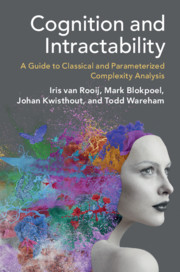Crossref Citations
This Book has been
cited by the following publications. This list is generated based on data provided by Crossref.
van Rooij, Iris
and
Blokpoel, Mark
2020.
Formalizing Verbal Theories.
Social Psychology,
Vol. 51,
Issue. 5,
p.
285.
Martin, Andrea E.
2020.
A Compositional Neural Architecture for Language.
Journal of Cognitive Neuroscience,
Vol. 32,
Issue. 8,
p.
1407.
van Rooij, Iris
and
Baggio, Giosuè
2020.
Theory Development Requires an Epistemological Sea Change.
Psychological Inquiry,
Vol. 31,
Issue. 4,
p.
321.
Agrawal, Akanksha
and
Zehavi, Meirav
2020.
Computer Science – Theory and Applications.
Vol. 12159,
Issue. ,
p.
16.
Kwisthout, Johan
and
van Rooij, Iris
2020.
Computational Resource Demands of a Predictive Bayesian Brain.
Computational Brain & Behavior,
Vol. 3,
Issue. 2,
p.
174.
Rich, Patricia
Blokpoel, Mark
de Haan, Ronald
and
van Rooij, Iris
2020.
How Intractability Spans the Cognitive and Evolutionary Levels of Explanation.
Topics in Cognitive Science,
Vol. 12,
Issue. 4,
p.
1382.
Wareham, Todd
and
Vardy, Andrew
2021.
The Computational Complexity of Designing Scalar-Field Sensing Robot Teams and Environments for Distributed Construction (Extended Abstract).
p.
232.
Pantsar, Markus
2021.
Descriptive Complexity, Computational Tractability, and the Logical and Cognitive Foundations of Mathematics.
Minds and Machines,
Vol. 31,
Issue. 1,
p.
75.
Love, Bradley C.
2021.
Levels of biological plausibility.
Philosophical Transactions of the Royal Society B: Biological Sciences,
Vol. 376,
Issue. 1815,
p.
20190632.
Rich, Patricia
Blokpoel, Mark
de Haan, Ronald
Otworowska, Maria
Sweers, Marieke
Wareham, Todd
and
van Rooij, Iris
2021.
Naturalism, tractability and the adaptive toolbox.
Synthese,
Vol. 198,
Issue. 6,
p.
5749.
van Rooij, Iris
and
Baggio, Giosuè
2021.
Theory Before the Test: How to Build High-Verisimilitude Explanatory Theories in Psychological Science.
Perspectives on Psychological Science,
Vol. 16,
Issue. 4,
p.
682.
Tsotsos, John
2022.
When We Study the Ability to Attend, What Exactly Are We Trying to Understand?.
Journal of Imaging,
Vol. 8,
Issue. 8,
p.
212.
Schumacher, Lukas
Bürkner, Paul-Christian
Voss, Andreas
Köthe, Ullrich
and
Radev, Stefan T.
2023.
Neural superstatistics for Bayesian estimation of dynamic cognitive models.
Scientific Reports,
Vol. 13,
Issue. 1,
Adolfi, Federico
Wareham, Todd
and
van Rooij, Iris
2023.
A Computational Complexity Perspective on Segmentation as a Cognitive Subcomputation.
Topics in Cognitive Science,
Vol. 15,
Issue. 2,
p.
255.
Reichman, Daniel
Lieder, Falk
Bourgin, David D.
Talmon, Nimrod
and
Griffiths, Thomas L.
2023.
The Computational Challenges of Means Selection Problems: Network Structure of Goal Systems Predicts Human Performance.
Cognitive Science,
Vol. 47,
Issue. 8,
Carchidi, Vincent J.
2024.
Creative minds like ours? Large Language Models and the creative aspect of language use.
Biolinguistics,
Vol. 18,
Issue. ,
Martínez, Manolo
2024.
The Information‐Processing Perspective on Categorization.
Cognitive Science,
Vol. 48,
Issue. 2,
Franco, Juan Pablo
Bossaerts, Peter
Murawski, Carsten
and
Marinazzo, Daniele
2024.
The neural dynamics associated with computational complexity.
PLOS Computational Biology,
Vol. 20,
Issue. 9,
p.
e1012447.
Adolfi, Federico
van de Braak, Laura
and
Woensdregt, Marieke
2024.
From Empirical Problem-Solving to Theoretical Problem-Finding Perspectives on the Cognitive Sciences.
Computational Brain & Behavior,
Vol. 7,
Issue. 4,
p.
572.
Tubert, Ariela
and
Tiehen, Justin
2024.
Existentialist risk and value misalignment.
Philosophical Studies,



